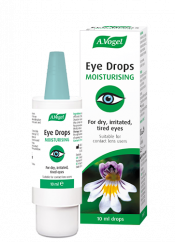An introduction to watery eyes
Most people experience watery eyes at some point in their life: on a cold, windy day; during hayfever season; while cutting onions; or after getting a bit of dust in the eye. Our eyes need this production of tears to protect the eyes and wash out any irritants or foreign bodies.
Sometimes, however, watery eyes become an irritating problem. It is most common in people over the age of 60 and in young babies.
What are the causes of watery eyes?
There are two main causes of watery eyes: over production of tears, and an obstruction to the normal drainage of tears. These, in turn, have a variety of causes, many of which are treatable underlying conditions.
Overproduction of tears tends to be the result of:
- Allergies such as hayfever or an irritant such as fumes or chemicals
- Dry eyes. This seems unusual, but if the eyes become too dry, your tear ducts can over-compensate by producing excess tears, causing watery eyes
- Weather. Cold, windy weather can irritate the eyes, cause them to sting or dry them out, resulting in watery eyes
- Infective conjunctivitis. Conjunctivitis can result in irritated eyes which can cause them to water. The infection can also causes discharge which can be clear and watery
- Blepharitis. This is a condition where the outer edges of the eyelids become inflamed. It is usually chronic with no cure; treatments instead focus on alleviating symptoms, which include itchy eyes, a burning sensation, crusty eyelashes or in severe cases, eyelash loss
- Keratitis. This is the inflammation of the cornea, which if left untreated can cause ulcers, which in turn can impair vision or cause blindness. This inflammation can irritate the eye, causing it to water.
The most common cause of poor drainage is a blockage of the tear duct. In this case, the eye produces a regular amount of tears but these tears are prevented from draining properly.
In babies this tear duct may not be functioning yet, meaning that tears cannot properly drain. It should open up on its own at some point before your baby turns one, but if it hasn’t you should consult your GP as they will be able to recommend a treatment.
Self-help for watery eyes
There are certain ways in which you can help prevent and relieve watery eyes without the need for treatment. These include:
- Wearing sunglasses or eye protection in windy conditions or bright sunlight, around fumes and around chemicals
- A hot or cold compress may help soothe irritated eyes
- If your watery eyes are the result of an allergy, then try tackling this first. If there is not treatment available for your allergy, try to simply avoid coming into contact with it
- If watery eyes occur in your baby, you can try gently massaging their tear duct with a clean finger. Gently massage from the corner of their eye to their nose, as this will dislodge any tears that have collected there, and encourage the tear ducts to develop
- You could try holding a warm, damp cloth over your eyes for five minutes while gently massaging your eyelids – this will help loosen anything blocking your glands
- Improve your diet so that you are getting all the nutrients your eyes need for healthy functioning. We have an article on good foods for eye health here.
Are there any herbal remedies that might help?
The herb Euphrasia is great for general eye health, but would be particularly useful if your watery eyes are caused by a secondary condition such as dry eyes, irritated eyes, conjunctivitis or blepharitis. We recommend using Euphrasia in eye drop form, such as the A.Vogel eye drops. These drops can be used whilst wearing contact lenses, and the specially designed bottle keeps them sterile without the need for preservatives.
If your watery eyes are caused by hayfever, then we recommend Pollinosan tablets to treat your hayfever.
Conventional treatment
Depending on the cause of your watering eyes, there are several conventional treatments available:
- An ophthalmologist may investigate the cause of your watery eyes by looking for blockages in the tear ducts. If found, these can be cleared surgically, by an operation called dacrocystorhinostomy (DCR). This operation creates a new passage between your tear sac and nose, bypassing the blocked tear duct, to allow water to drain properly
- If the duct is narrowed as opposed to completely blocked, it can be widened using a small probe or tube
- If your watery eyes are the result of dry eyes, the use of lubricant eye drops should help to clear up the condition
- If your watery eyes are the result of allergies an antihistamine may help
- If your watery eyes are the result of bacterial conjunctivitis, your doctor may prescribe antibiotics. If it is caused by a different kind of conjunctivitis this will normally clear up on its own, and you can use a number of self-help methods and natural treatments such as cold or warm compresses to speed up recovery.





 Looking for help to ease those dry, tired and irritated eyes?
Looking for help to ease those dry, tired and irritated eyes?

